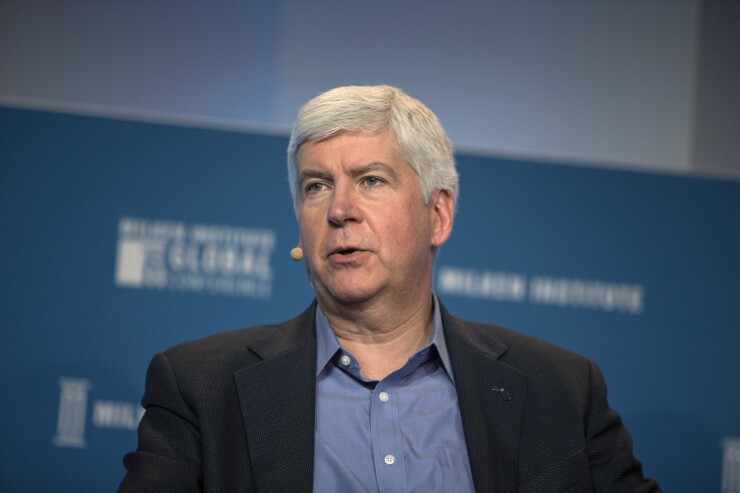Michigan Gov. Rick Snyder and other state officials were dismissed from a lawsuit filed against the state over its role in the Flint water contamination crisis.
The

However, Levy said that unlike other defendants who they said knew and disregarded the hazards involved. Based on this, Levy dismissed the governor as a defendant. Snyder’s administration declined to comment on the dismissal.
The claims filed on behalf of 12 Flint residents and three businesses, could pose a financial burden for the recently upgraded state. The complaints named 27 defendants, including state and local agencies and officials. The plaintiffs are asking the Court to establish a Flint Victims Compensation Fund, providing the affected Flint residents with medical and financial assistance.
The crisis has also cast a negative light on the state's Emergency Manager law for distressed local governments.
Levy's ruling Wednesday robbed Flint families and businesses of an opportunity for justice, said Senate Minority Leader Jim Ananich, D-Flint. “The fact that he is shielded from being held accountable is another crime in and of itself,” Ananich said in a statement.
Levy ruled that former Michigan Department of Environmental Quality director Dan Wyant, former Flint emergency manager Ed Kurtz, former Flint mayor Dayne Walling, and former health and human service official Nancy Peeler are dismissed from the case along with Snyder.
Former State Treasurer Andy Dillon , who was involved in the decision to switch to the Flint river water, former Michigan Health and Human Services director Nick Lyon, former emergency managers Gerald Ambrose and Darnell Earley, Genesee County Drain Manager Jeff Wright were kept as defendants.
Ambrose served as Flint’s EM from January 13, 2015 through April 28, 2015. Earley was named EM in September 2013 and served until January 2015.
According to the document the plaintiffs allege that the defendants knew prior to the switch that the Flint River was professionally evaluated and rejected as a drinking source.
The decision to source water from the Flint River was made in 2014, after the city's contract with Detroit to receive Lake Huron water ended and the city was wiating for the completion of the new, bond-financed Karegnondi water pipeline. The $285 million pipeline was to provide Lake Huron water to Flint and Genesee County communities. Flint has since entered into a long-term primary water agreement with the Great Lakes Water Authority.
The city failed to properly treat the Flint River water and in the fall of 2015 shifted back to Detroit-supplied water, Lead contamination continued due to pipe corrosion from the improperly treated river water. Flint-area residents died of Legionnaires’ disease in the time immediately following the switch.
In July, S&P Global Ratings raised the state’s general obligation bonds one level to AA from AA-minus and assigned a stable outlook, with its appropriation-backed debt rising in tandem to AA-minus from A-plus.





